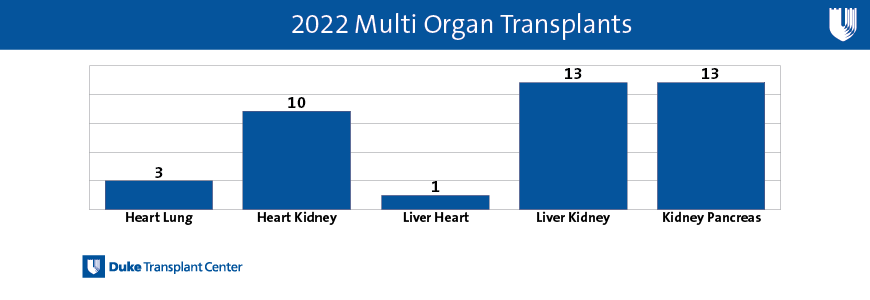Duke transplant specialists performed 40 multi-organ procedures during 2022, an accomplishment that places the program in the top ten nationally, according to data from the Organ Procurement and Transplantation Network (OPTN).
The high ranking among major medical centers highlights the success of a cohesive, high-performance program, says Ian R. Jamieson, MBA, MHA, vice president of the Duke Transplant Center. Significantly, outcomes for patients undergoing those procedures are also excellent, he adds. The 2022 data indicates an increase over the team’s 38 multi-organ transplants during 2021.
“Whenever a medical center completes a multi-organ transplant, it’s evidence that your team is working at the top of its game,” Jamieson says. “We are proud to have highly functioning teams across all organ programs functioning with a high level of multi-disciplinary cooperation.”
Duke Health does not actively seek multi-organ transplants, Jamieson says. But the center has established a reputation as a high-volume program with successful outcomes led by specialists willing to accept patients facing complex challenges, often after being turned down at another program. Those patients often seek out the Duke Transplant Center for a second opinion.
Single procedure may be preferred clinical option
The decision to proceed with a multi-organ procedure is based on a rigorous clinical assessment, Jamieson says. Specialists must first identify which organ is primary, Jamieson notes, and then outline steps to manage the complex processes of listing patients and managing their care.
The Duke Transplant Center completed its 10,000th solid-organ transplant in June 2022, crossing a threshold reached by fewer than 20 centers in the United States, according OPTN data. Duke leads all Carolinas hospitals in transplant volume and ranks among the leaders in the Southeastern US.
“If we have a clinical situation involving a patient in which the multi-organ option is right for the patient, and our team believes this option is materially better than a single procedure now and another at a later date, we will opt for the multi-organ option,” Jamieson says.
Having a patient recover from a single procedure rather than undergo two complex transplants is usually a preferred clinical option, Jamieson says. “It’s a tremendous emotional burden for a patient to face a second major procedure.”



